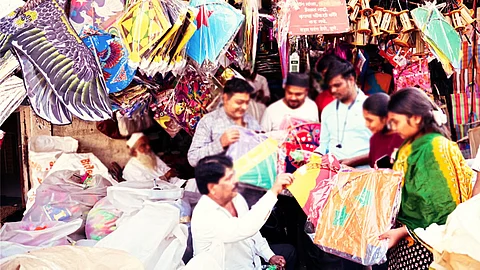

Pune: As the kite-flying season begins with the start of January, the use of banned nylon kite strings (manja) has once again become a matter of concern in Pune. Despite restrictions, the harmful string is being openly sold, endangering lives and raising questions about enforcement.
In the last two weeks alone, there have been six incidents where nylon strings injured birds and humans. The strings, known for their sharpness, are favored for their ability to cut kites more effectively. A teenager from the Kondhwa area admitted, "Normal strings don’t cut kites easily, so I bought nylon manja for ₹1,000 per bundle. But we must be careful while purchasing since it’s banned."
Birds and Humans at Risk
Discarded kite strings often get tangled in trees, electric poles, and wires, causing accidents. Over the past two weeks, many citizens have reported injuries caused by these strings. Birds such as crows, bats, kites, sparrows, and even larger birds have been found injured or dead due to entanglement. The sharp synthetic strings can sever wings, injure bones, and often result in fatalities.
According to Nachiket Utpat, Director of ResQ Charitable Trust, "Most cases of injured birds occur between December and February. These include kites, owls, crows, and parrots. Synthetic strings cause bone damage and wing cuts, but timely intervention can save them."
Sales Continue Despite Ban
In 2017, the state government imposed a ban on nylon strings, citing risks to humans, animals, and the environment. Violations are punishable with fines of up to ₹5,000 and imprisonment of up to three years. However, an investigation revealed rampant sales of nylon and glass-coated strings in areas such as Katraj, Dhanakwadi, Kondhwa, Parvati, and Camp.
Despite the ban, law enforcement has been largely ineffective. Activists demand stricter penalties for sellers and users alike. "String vendors and users should both face penalties," said Rajendra Kamble, a bird rescuer.
Yearly Statistics on Injured Birds
2020: 940 cases
2021: 753 cases
2022: 895 cases
2023: 887 cases
2024 (till now): 617 cases
